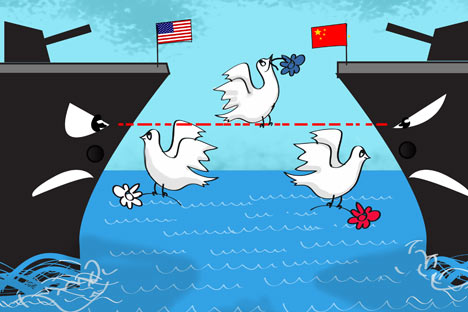US-China rivalry looms off Russia’s Far East borders

Drawing by Niyaz Karim. Click to enlarge.
The chances of naval confrontation between the U.S. and China in the Pacific are heavily debated. Though both countries are responsible for heightened political and military tensions in the region, it is Russian territorial security and economic interests in modernization that could suffer if conflict exploded in East Asia.
An important aspect of the rivalry between the U.S. and China — which is taking on increasing significance in East Asia — is the potential for naval confrontation. The face-off is a topic of parliamentary debate and media discussion, already finding itself on the agenda of many international conferences and seminars.
All too often, the impression created is that "China is to blame for everything."
Related:
US withdrawal may push Central Asia toward Russia
The strategic triangle in the East: China, Russia and the US
The data points to the methodical build-up of China’s surface and submarine fleet, the coastline deployment of precision anti-ship missiles, and the creation of enhanced tools to track maritime targets and disable enemy command-and-control systems.
According to U.S. experts, the main objective of China’s build-up is to "limit access" to the U.S. Navy in various regions of the Pacific Ocean.
The wording is technical in nature, though replete with latent resentment. After all, everyday "access" to the Internet has taught us to believe that the very concept is a sacred human right. Thus, if U.S. sailors need "access" to territorial waters, then how can it be denied?
All the more so, given that naval bases and patrols — along with intelligence gathering — along China's coast have been America’s bread and butter for more than half a century.
The U.S., along with its faithful allies, wields such force — in the form of six aircraft carrier groups — as a guarantee of political stability, economic prosperity and secure international shipping lanes across the entire East Asian region.
Even the mere suggestion that "forward deployment" could, in the eyes of the Chinese or anyone else, appear to be an act of open aggression and expansionism is deeply offensive to the American psyche.
In Washington's official interpretation, the principle of freedom of navigation requires that the 200–mile economic zones of all coastal nations be open to foreign military vessels. The United States justifies its right to "access" the Chinese coast on this very proposition.
When U.S. diplomats are asked how their country's administration would react to the presence of Chinese warships in the exclusive economic zone of the United States, they assert that there would be no objection — omitting the fact that China is not yet capable of mounting such an expedition.
However, if China's naval capabilities and control of the seas continue to grow, will we see such an incursion in future? If so, expect the U.S. to promptly revise its policy of acquiescence.
The problems outlined above do not only affect U.S.–Chinese bilateral relations. The level of military and political tension is rising throughout East Asia. The question hovers: will the rivalry between the two powers undermine regional stability, without which the continued growth and integration of the East Asian economies would founder?
Russia, which harbors plans to exploit the economic potential of Siberia and its Far East in close cooperation with its Asian neighbors, has something to mull over — in particular, the fact that any escalation between the U.S. and China is not in its national interest and does not agree with its comprehensive program of modernization.
It is reassuring that many other countries in the region share these sentiments. Consequently, there is hope for a multilateral dialogue on Asian security, underpinned by joint actions and agreements.
As Russia's resurgence continues, its contribution here will be even more vital — economically, politically, and militarily. In this context, the modernization of the Russian armed forces (including the Pacific Fleet) comes not a moment too soon.
On the other hand, given the uncertainties that lie ahead, how can we vouch that no dangerous conflict will ever flare up on our Far East borders? In such circumstances, it is our duty to ensure that no confrontation — however hypothetical — could ever spill over into Russian territory.
Victor Sumsky holds a Ph.D. in history and is the director of the ASEAN Center at the Moscow State Institute of International Relations (MGIMO) under the Russian Foreign Ministry.
All rights reserved by Rossiyskaya Gazeta.
Subscribe
to our newsletter!
Get the week's best stories straight to your inbox
